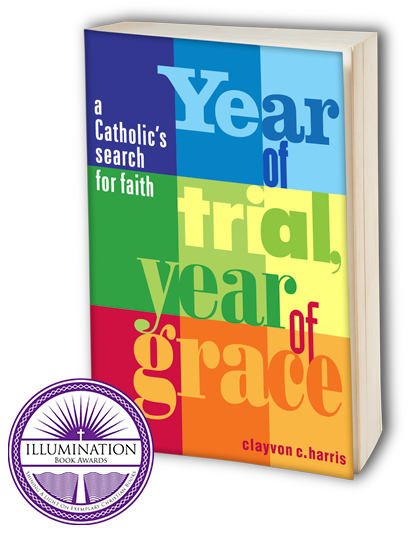(Best new titles with a Christian worldview)

Multi-award Winning Title!
(Best new titles with a Christian worldview)
An inspiring and provocative revelation of one person’s religious faith, Year of Trial, Year of Grace: A Catholic’s Search for Faith is topical, deeply intimate and very readable. Written as a series of weekly reflections, this book provides support and encouragement for anyone who has struggled with faith and acceptance in the face of life’s day-to-day challenges.
With themes ranging from guilt and gossip to dreams and disappointment, from the Catholic priest scandal to the power of prayer, Year of Trial, Year of Grace offers a contemporary perspective that both questions and proclaims the role of faith in everyday life, and in the cultivation of a more personal and practical relationship with God.
“I hope that these reflections will not only encourage and strengthen the resolve of Catholics, but anyone who has struggled with faith and acceptance in the face of life’s day-to-day challenges and unexpected trials.”
– Clayvon C. Harris
Photo by S. Hermann & F. Richter from Pixabay
Sample Reflections
Catholicism Is Complicated
September 19th
Catholicism is complicated. Even daunting at times. Other Christian religions are far more accessible, far simpler to understand and engage in. You show up, listen, pray and go home. And that's it. This is not the case with our religion. Though beautiful, the very structure of our worship service is singularly complex.
There are a multitude of prayers and creeds to be memorized. We must know when to sit, stand, kneel and shake. And each Sunday, we must judge ourselves worthy (or unworthy) of receiving Holy Communion.
Beyond the workings of Mass and the fundamental tenets of our faith, there is so much more to master. The differences between deacons, priests, bishops and cardinals. The countless orders and responsibilities of nuns… feast days, holy days, not to mention a pantheon of saints. In a given year, there are hundreds of special ceremonies, dedications and processions – all with their own unique sets of customs.
To many outsiders, our religion appears to be shrouded in mystery and symbolism. Ironically, it can also seem that way from the inside. Many of us are experienced, practiced Catholics. But few of us are completely versed in all of the intricacies of our church's traditions. So then, is it necessary to become so, or are we promoting and supporting meaningless rituals?
Perhaps there is another answer? Maybe these rites are meant to facilitate active interaction with God. We have all gotten distracted and missed a cue to kneel or bow. We've all stumbled over a line in the Nicene Creed. The important thing is to recognize these ceremonial procedures not as requirements, but as wonderful opportunities to keep seeking... and to keep opening our hearts and minds to the love of Christ.
“The [Lord] said to him, ‘You shall love the Lord, your God, with all your heart, with all your soul, and with all your mind. This is the greatest and first commandment. The second is like it: You shall love your neighbor as yourself. The whole law and the prophets depend on these two commandments.’” Matthew 22:37-40
God In Our Midst
June 26th
God in our midst. Recently, the Rev. Charmaine Anderson, a longtime family friend, invited us to the anniversary celebration of her church. She founded it 14 years ago, and has struggled every moment since to keep the doors open. Shamefully, I must admit that I had never once been to visit. My shame is magnified by the fact that Rehoboth Baptist Church* is literally down the street and around the corner from St. Athanasius [my home parish]. How often, I wondered, had our congregation and theirs simultaneously lifted our voices in praise? How many times had we called on the same Father at the same time for strength and support?
Advised ahead of time that Rehoboth was a small church, I was still surprised to find a one-room basement walkout. There was a podium, a long table and about 25 chairs crammed snugly together. There was no air-conditioning. So on this warm day, the doors were left open so that we could "catch the breeze." Instead of a choir, they had a keyboardist and one dedicated, spirit-filled woman backed up by the pastor and her tambourine, and anyone else who cared to join in.
Standing in stark contrast to the cool marble, beautiful stained glass and spacious settings of both the upper and lower churches of St. Athanasius, Rehoboth is tiny. But when the service started, I felt the presence of God in a big way: in the powerful, heartfelt songs of praise and in the pastor’s gentle but determined words; in the warm welcome of the members, and the humble and gracious invitation to share in a light repast.
Often, we as Christians become siloed; separating ourselves based on religious differences. We avoid connection and sometimes support. Perhaps the key is not to compare, building to building, congregation to congregation, or tradition to tradition; but to remember the fundamental truth upon which our churches are based: “For where two or three are gathered together in my name, there am I in the midst of them.” Matthew 18:20
*Due to economic constraints, Rev. Dr. Charmaine Anderson closed the doors of Rehoboth Baptist Church in February, 2012. She continues in service to the Lord wherever she is called.
Forgiving Is So Hard
March 27th
Forgiving is so hard. Yet, it’s one of the fundamental tenets of Catholicism. “...and forgive us our trespasses as we forgive those who trespass against us.4” We count on the forgiving nature of our Father, especially when we’ve behaved in a less than Christ-like manner. When we’ve lost our tempers, or manipulated a situation in our favor. When we’ve put our wants before others’ needs or thoughtlessly betrayed a friend. We know that we’ll be forgiven. After all, we have but to ask.
This is how God deals with us; and this, theoretically, is how we should deal with one another. But what happens when the offense is grievous? When understanding, much less forgiving, is beyond our ability and scope? When children are molested and an entire community is betrayed by those claiming to be servants of God? Forgiving under these circumstances calls for a spiritual depth and grace that few people possess, and for which few people are willing to pray.
What a blessing that forgiveness rests not in our hands, but the hands of the Lord. What a gift that we do not have to forgive in order to be forgiven.
The Believers
June 5th
“I thought if someone who believes prayed...” Heartbreaking words from my friend Juan Martinez. A week earlier we'd been at lunch, debating the topic of the day. While my perspective tends, inevitably, to hearken back to my religious beliefs, Juan was fairly certain that God either didn't exist or didn't care. Before we had a chance to delve deeper, Juan's phone rang. Something was wrong with his son.
A week later, he told me that his son, Jonathan, a sweet, twenty-something young man with special needs, had been diagnosed with a very large and inoperable brain tumor. “Will you pray for him?” he asked wiping away tears. “I thought maybe if someone who believes prayed... God would listen.” I hugged him, assuring him that I would and wondering why it is that people think that because they don't believe in God... God doesn't believe in them.
I passed the request on to family members and a few friends who belong to prayer groups. We prayed sincerely; however, over the next few weeks, things went from bad to worse. The only hope was targeted radiation, but because his son wasn't capable of staying still during the treatment, they would also have to sedate him... complicating the procedure and driving up the costs beyond his insurance limits. Even worse, they didn't have any anesthesiologists on staff who would voluntarily interrupt their standard schedules to help out. So, unless they were able to find a part-time anesthesiologist who was willing to come in just for that, and so far they hadn't, they would be unable to treat Jonathan.
Juan was beside himself with fear and anger. University of Pennsylvania is one of the best hospitals in the country. If they couldn't – or wouldn't – do it, what chance did Jonathan have? Juan didn't know if he should wait for a definitive answer or start calling other hospitals. And he didn't want to hear it when I told him that we'd keep praying; not just for Jonathan but also that he'd find the strength to do what needed to be done. He looked at me like I was insane, but I felt oddly certain that somehow, things would work out.
“You pray too,” I said before leaving him.
(Cont'd)

